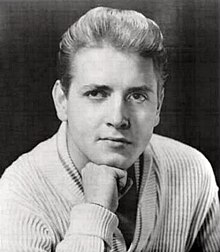
Back إدي كوشران Arabic ادى كوشران ARZ ادی کوچران AZB Еди Кокран Bulgarian Eddie Cochran Catalan Eddie Cochran Czech Eddie Cochran Danish Eddie Cochran German Eddie Cochran Esperanto Eddie Cochran Spanish
Eddie Cochran | |
|---|---|
 Cochran in 1957 | |
| Background information | |
| Birth name | Ray Edward Cochran |
| Born | October 3, 1938 Albert Lea, Minnesota, U.S. |
| Died | April 17, 1960 (aged 21) Bath, Somerset, England |
| Genres | |
| Occupations |
|
| Instruments |
|
| Years active | 1950–1960 |
| Labels | |
Ray Edward Cochran (/ˈkɒkrən/ KOK-rən; October 3, 1938 – April 17, 1960), known professionally as Eddie Cochran, was an American rock and roll musician. His songs, such as "Twenty Flight Rock", "Summertime Blues", "C'mon Everybody" and "Somethin' Else", captured teenage frustration and desire in the mid-1950s and early 1960s.[1] Cochran experimented with multitrack recording, distortion techniques, and overdubbing, even on his earliest singles.[2] Cochran played the guitar, piano, bass, and drums.[1] His image as a sharply dressed and attractive young man with a rebellious attitude epitomized the stance of the 1950s rocker, and in death, Cochran achieved iconic status.[3]
Cochran was involved with music from an early age, playing in the school band and teaching himself to play blues guitar.[2] In 1955, Cochran formed a duo with the guitarist Hank Cochran (no relation) and became known as the Cochran Brothers. When they split the following year, Eddie began a song-writing career with Jerry Capehart. His first success came when he performed the song "Twenty Flight Rock" in the film The Girl Can't Help It, starring Jayne Mansfield. Soon afterward, he signed a recording contract with Liberty Records and his first record for the label, "Sittin' in the Balcony", rose to number 18 on the Billboard charts.
Cochran died at the age of 21 in St Martin's Hospital, Bath, Somerset, after a car accident in Chippenham, Wiltshire, at the end of his British tour with Gene Vincent in April 1960. On April 16, after they had just performed at the Bristol Hippodrome, on their way to their next venue, Vincent, Cochran and the songwriter Sharon Sheeley were involved in a high-speed traffic accident in a private-hire taxi. The other two passengers survived with major injuries, but Cochran, who had been thrown from the vehicle, suffered serious brain injuries and died the next day.
Though Cochran's best-known songs were released during his lifetime, more of his songs were released posthumously. In 1987, Cochran was inducted into the Rock and Roll Hall of Fame. His songs have been recorded by a wide variety of recording artists. Paul McCartney himself chose Cochran's "Twenty Flight Rock" as his audition piece, assured to impress John Lennon by his performance of it, which he did and was hired as a member of Lennon's skiffle group The Quarrymen, which later was renamed The Beatles.
- ^ a b Hill, Michael (1987). "Eddie Cochran: Hall of Fame Essay". Inductees of the Rock and Roll Hall of Fame. Cleveland, Ohio: Rock and Roll Hall of Fame. Retrieved April 14, 2020.
- ^ a b Cochran, Bobby; Van Hecke, Susan (2003). Three Steps to Heaven: The Eddie Cochran Story. Milwaukee, Wisconsin: Hal Leonard. ISBN 978-0634032523.
- ^ Deming, Mark (2020). "Eddie Cochran Biography". AllMusic. Retrieved April 14, 2020.